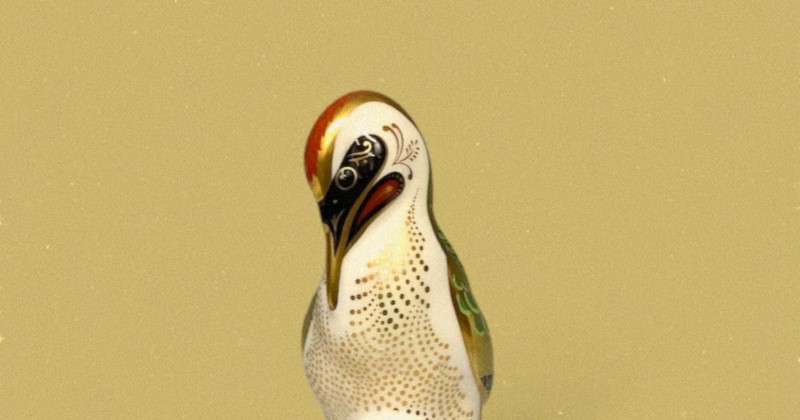A small Derby property has revealed one of the most incredible collections of carvings to come onto the market in recent years. The great Fabergé, known for his world famous jewelled eggs, the subject of films and fairy tales from Disney to James Bond. It was not only the Russian tzars that favoured the works of Fabergé but also our own King, the son of Queen Victoria, Edward VII. The great Russian jeweller set up his own London retail shop and to help supply it employed the great British carver, Alfred Lyndhurst Pocock. This incredible collection includes jewelled precious carvings from opal, Jade, crystal, animals set with ruby eyes and Pre-Raphaelite beauties with flowing hair, but these were not pieces destined for the Fabergé shop, these were Pocock’s personal collection carved for his own joy and satisfaction, something that makes them all the more special.
Pocock or ‘Lyn’ as he was affectionately known by his friends and family was born on Christmas Eve 1881. He was the son of two painters Lexden Pocock and Alicia Shellschar and his grandfather was Lewis Pocock, a revolutionary figure who founded the Art Union which brought art to the masses. Descending from a family of artists it was inevitable that Pocock would go on to study within the arts. He trained at the Regent Street Polytechnic and in 1903 won a scholarship into the Royal Academy Schools for a period of three years.
In 1905 Queen Alexandra approached the Royal Academy Schools to ask for an artist to undertake a Royal Commission, they recommended Pocock, a scholarship student who was then in his twenties. Pocock produced the models for the commission which were sent to St. Petersburg to Fabergé for carving. When the carvings were completed, Pocock personally presented his carvings to the Queen, these consisted of an Owl in labradorite, a grey Donkey in chalcedony carved from a stone found upon the beach at Sidmouth and an Elephant carved from a pebble he picked up on Hampstead Heath. Queen Alexandra was delighted with the carvings and had won his full admiration, she would often show them to her friends, she had always admired the craftsmanship of Fabergé’s workshop but often added “this is an example of what an Englishman can do”.
This introduction and link between a master craftsman and the most famous Russian goldsmith and jeweller Fabergé would form a successful relationship that lasted approximately thirteen years. Most of the carvings produced would have to have been carried out in Fabergé’s own workshop in St. Petersburg. Pocock would produce the small plaster maquettes which could then be copied and carved in a range of chosen stone or other material for the finished piece. It is believed that to this day Pocock is the only Englishman who has carved for Fabergé.
When the House of Fabergé was forced to cease trading due to the Russian Revolution, Pocock decided to carry on alone. He carried on carving and later instituted his own school in London. In his early days Pocock would usually collect most of his materials for producing his carvings but later he bought them from Percy and Winifred Bottley of Gregory, Bottley & Co. Percy and Winifred Bottley were Mineralogists of Old Church Street. The relationship between the Bottley’s and Pocock was one that would last a lifetime, and it is noted that the Bottley’s would often put stones aside for him that they thought might inspire his imagination (reference – see article image that shows Alfred (right) with Percy Bottley and his wife, at one of his Chelsea exhibitions in the 1950’s). Alfred did not only work in minerals but also was noted for using materials such as amber, mother of pearl, coral, wood and even terracotta. A fabulous example of how diverse his material choice was is ‘The Yawn’, an amusing caricature of an elongated dormouse carved from wood taken from a fallen laburnum in the garden of Winifred Bottley.
Pocock became a prolific sculptor and craftsman, it is believed that he completed more than forty-five single carvings in the space of a year. He was known for regularly keeping his carvings in his pocket along with his tools which he kept in an old spectacle case for carving while travelling to and from London on the steam trains (the spectacles case is included within the auction, see Lot 1210). Latterly in life Pocock lived at Slinfold in Sussex, where he died in 1962.
The collection was inherited by Winifred Bottley and upon her death a Derbyshire relative.
Bamfords Auctioneers & Valuers of Derbyshire are delighted to announce that The Fabergé Carver Alfred Pocock Collection of carvings will be offered for sale in our forthcoming Four Day Fine Art and Antique auction which will be held between Tuesday 31st October and Friday 3rd November 2023. The entire auction comprises of over 2,100 lots and includes over 80 lots from the Collection and Workshop of Alfred Lyndhurst Pocock (1882 – 1962).
The auction which will be held at the new Derby Auction House, 46 Nottingham Road, Spondon will also include the contents of Newton Old Hall, a ten bedroom 16th century manor house, a house that time forgot and part one of the Dennis Bradley Collection of Nutcrackers.






